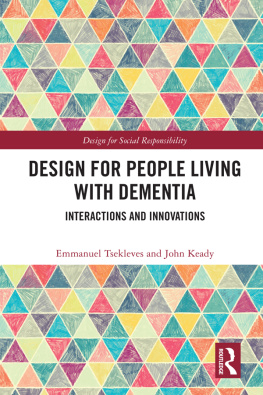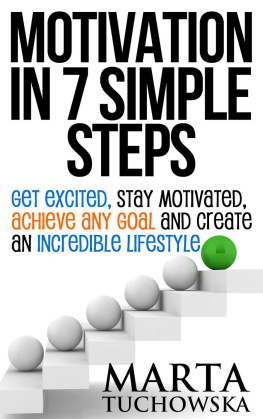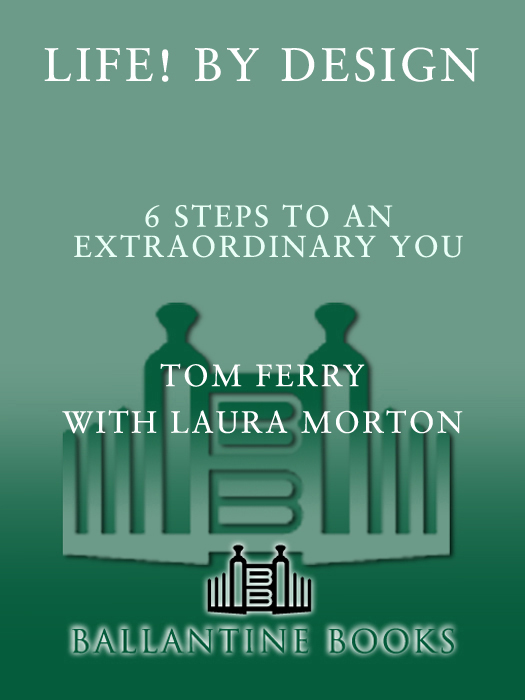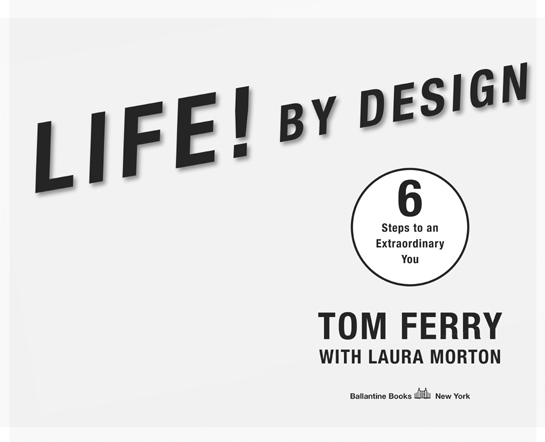INTRODUCTION
As a success coach, I think of myself as a life strategist in a business world. I travel from city to city giving lectures and conducting seminars that help change peoples lives. Often while giving these talks, Ill lock eyes with someone in the audience I sense is in need of special attention, someone whos reacting stronglybut not necessarily happilyto my message. Theres a look people get when theyre hearing things, often for the first time, that tap into fears theyve been struggling to keep at bay, and when I see that expression of panic or desperation, I try to connect to it, to help draw it out.
A few years back I noticed a womanIll call her Marysobbing throughout one of my presentations. What I found strange was that this particular event was an uplifting and inspirational sales training course, so her emotional response seemed quite out of the ordinary. My workshops are often designed to evoke a fervent response from the participantsto upset their applecartbut this wasnt one of those times.
During our first break, I decided to look for Mary to make sure she was okay. When I found her, I asked what was wrong. It didnt require much more of a push than that to get her to tell me.
Im the number one real estate salesperson in my company and number sixteen in the country, she explained. But my all-business approach is taking its toll on every other area of my life. I dont know what to do.
Id heard this story many times before, so I asked her some pointed questions.
Are you married or single? Id barely spoken the words when she began to cry again. I took her tears to mean she was married but maybe not for long.
Do you have kids? Her sobs now became loud wails as she spoke about her three-year-old daughter and nine-year-old son.
Are you with them as often as youd like? Not surprisingly, this question nearly brought her to her knees.
I feel as if I hardly know my own children!
The pain, guilt, and anguish she was feeling about how out of balance her life had become was palpable; clearly, she had hit a wall. There was no question the woman knew how to be successful in business, but she didnt have a clue about how to be successful in life. She had put all of her eggs in her career basket, and now everything else was suffering. What happened? How did she get here?
For much of my professional life, Ive worked as a success coach to individuals and corporations specializing in sales and marketing. I help people like Mary become more successful in their chosen field, while simultaneously achieving a better balance across all the key areas of their lives. Thats what I do, and thats why Ive been invited to speak to dozens of leading corporations and have served as head coach to hundreds of top executives over the past twenty years.
After my conversation with Mary, I agreed to take her on as a client, to help coach her through this tough transition in her life. But first I needed her to agree that she would make whatever adjustments I asked of her. She quickly got on board without hesitation.
A week later, Mary had her first coaching session. I asked her to tell me more about her business.
Im the open house queen of my town, she said.
Okay, I thought. Stop right there.
Many of my clients have worked in real estate, an arena with which I am extremely familiar. So I knew that if Mary held open houses as often as she said, she spent all of her weekends selling real estateand none at home with her family. Her kids were in school and her husband worked Monday through Friday. I asked her what days she worked.
Monday through Sunday.
This was the answer Id feared, and expected. She worked virtually all the time. Most importantly, she hadnt been able, or willing, to be home on the weekends with her family.
And how is that working for you? I asked with my tongue firmly planted in my cheek, knowing full well it wasnt working for her at all.
It was obvious that every choice she made had driven her to incredible levels of success in her business but had also pushed her personal life into a state of crisis. Most of us overcompensate in one area of our lives as a way of masking problems in other areas. I have dozens of clients who throw themselves into work as a way of avoiding dealing with troubles in other aspects of their lives, such as their marriage, relationships, finances, and health. When I ask if they know why they do that, most of them come back with some excuse or another, but never a valid reason.
But there is a reason; theres always a reason. For most of us, its easieror we imagine its easierto keep slogging forward on autopilot, what I call living by default, than to ask ourselves the hard questions and make the necessary changes to live By Design. Living by default means choosing to live with pain and disappointment, falling short of our potential in every area of our lives.
Why do we choose this? Is being stagnant really easier than facing change? When you think about it, how easy is it to deal with daily struggle, self-pity, and failure?
Heres the thing. To achieve real change and growth, you have to decide what youre not taking responsibility for in life.
What are you avoiding?
For some of us its painand for others intimacy. Maybe you feel lost, bored, or unchallenged at work. Perhaps youre afraid of change or have become so comfortable in your present state that any thought of disturbing your seemingly peaceful existence scares you to death. Whatever your reasons, its time to call out the white elephant, assume responsibility, make some new choices, and then take action.
To test Marys commitment, I asked if shed be willing to cancel all of her open houses for the upcoming weekend and create a different approach to being a mother and a wife.
She began to cry because, although my suggestion was a simple one, it represented an entirely different way of life for her. But it was clear she wanted to try, so I gave her an immediate task.
I want you to go buy the strongest sunblock you can find, grab your kids, and head to the beach. I told her to keep driving west until she saw the infinite blue Pacific in front of her. She was taking notes furiously as I spoke.
Pack a picnic lunch. Got it.
Bury the kids in the sand. Got it.
Toss the Frisbee. Got it.
Yup. She was taking notes on how best to ensure a day of fun at the beach with her kids. Thats how bad it had gotten for Mary, and how desperately important it was to her that she get it right.
And boy did she ever. Sixty days after that first conversation, her marriage was back on track, and she had become an extraordinary hands-on mother who spent more time with her children, made them dinner, and even helped them do their homework. And as happy as she was about this outcome, she was just as astonished to discover that her sales had actually gone








